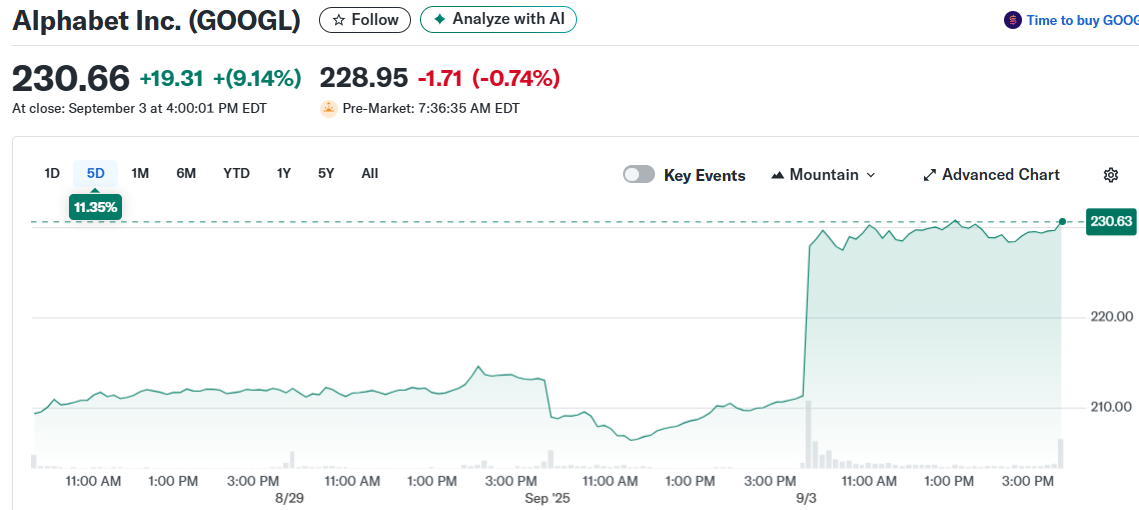TLDR
- GOOGL stock jumps 9% after federal judge blocks Chrome browser sale requirement
- Google launches Universal Ledger blockchain targeting financial services industry
- Court ruling preserves lucrative Apple search partnership worth billions annually
- CME Group partnership provides institutional credibility for blockchain project
- AI competition from ChatGPT helped Google avoid harsher antitrust penalties
Alphabet stock rocketed over 9% following a federal court decision that spared Google from selling its Chrome browser. The ruling removes a major threat while the company pushes forward with ambitious blockchain plans.

Judge Amit Mehta rejected demands for Chrome divestiture in the landmark antitrust case. His decision cited growing competition from AI chatbots as evidence that Google’s search monopoly faces real challenges.
The court noted that millions now use ChatGPT, Perplexity, and Claude for information gathering. These AI tools represent genuine alternatives to traditional search engines. This competition made harsh remedies against Google less necessary.
Legal Victory Preserves Key Revenue Streams
The ruling protects Google’s default search deal with Apple. This partnership generates billions in annual revenue for both companies. Apple shares also climbed 3% on news the agreement remains intact.
Months of uncertainty had pressured Alphabet stock as investors worried about potential breakup scenarios. The court decision eliminates that overhang and allows management to focus on growth initiatives.
Google avoided the most severe penalties while maintaining its core search business. The company can now redirect attention toward emerging opportunities in blockchain and AI.
Blockchain Push Targets Finance Sector
Google’s cloud division is developing the Universal Ledger blockchain for financial services. The project aims to create neutral infrastructure that banks and payment providers can use without strengthening competitors.
Rich Widmann leads Google’s Web3 strategy and positions the ledger differently than rivals. Stripe’s Tempo blockchain connects to its merchant network while Circle’s Arc centers on USDC stablecoin operations.
Google frames its approach as open territory for institutions. Companies hesitant to support rival ecosystems might prefer Google’s neutral platform. The strategy targets the entire financial industry rather than specific segments.
CME Group has completed initial integration testing with the Universal Ledger. The derivatives exchange sees cost-cutting potential for collateral management and settlement operations. Their partnership provides immediate credibility with institutional clients.
Technical Features and Timeline
The blockchain will support Python-based smart contracts for easier development. This accessibility could attract financial engineers building tokenized assets and settlement applications. Google designs the infrastructure to scale for billions of users.

Full trials expand later this year with commercial services launching in 2026. This timeline places Google behind Circle and Stripe in blockchain development. However, the CME partnership establishes Google as an institutional-focused player.
Alphabet maintains Strong Buy ratings from 27 of 36 analysts. The average price target reaches $226.28 with potential for continued gains as blockchain revenue materializes.





